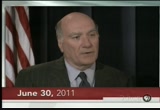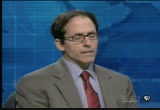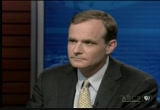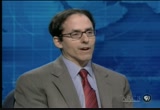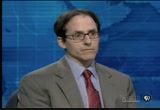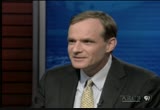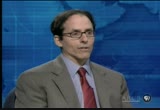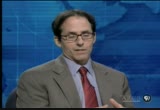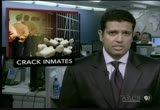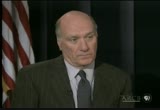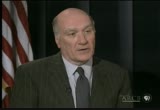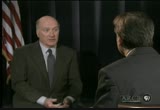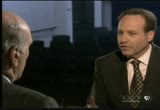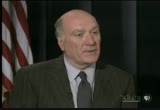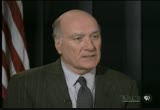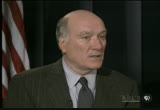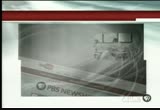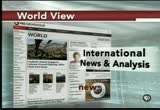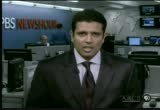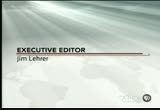tv PBS News Hour PBS June 30, 2011 5:30pm-6:30pm PDT
5:30 pm
captioning sponsored by macneil/lehrer productions >> brown: greek lawmakers passed a second cost-cutting bill aimed at averting deult today, while in britain thousands of public sector workers went on strike rallying against pension reforms. good evening. i'm jeffrey brown. >> warner: and i'm margaret warner. on the "newshour" tonight, we look at whether austerity measures can work to spur economic growth and help solve the european debt crisis. >> brown: then, we have a newsmaker interview with white house chief of staff bill daley about the stalled debt talks, a day after the president scolded congress.
5:31 pm
>> warner: betty ann bowser reports on a colorado hospital where medical mistakes are rare. >> one in three americans are at risk of a hospital acquired infection or will become a victim of a medical error. this hospital in denver is doing something about that. >> brown: ray suarez explores the prospect of another tech bubble. this time from social media websites. >> warner: and we get a rare view of dissent in china, following a new surge of protests by young people and labor union members. >> brown: that's all ahead on tonight's "newshour." major funding for the pbs newshour has been provided by: >> auto companies make huge profits. >> last year, chevron made a lot of money. >> where does it go? >> every penny and more went into bringing energy to the world. >> the economy is tough right now, everywhere. >> we pumped $21 million into local economies, into small businesses, communities, equipment, materials. >> that money could make a big difference to a lot of people.
5:32 pm
>> and by the bill and melinda gates foundation. dedicated to the idea that all people deserve the chance to live a healthy productive life. and with the ongoing support of these institutions and foundations. and... this program was made possible by the corporation for public broadcasting. and by contributions to your pbs station from viewers like you. thank you. >> warner: once again today, debt-laden governments in europe grappled with massive public anger over austerity measures they'd imposed. in greece, the government won a bitter struggle today to rein in debt for bailout help. and in britain, civil servants
5:33 pm
took the streets. a tense calm returned to athens, greece today, but shards of glass lay strewn on the sidewalks and charred debris was stacked in the streets. they were the remnants of riots that raged into the night as protesters set fires and battled police, who fought back with clouds of tear gas. even so, the greek parliament voted today to implement the austerity measures it had endorsed yesterday. the international monetary fund and the european union had demanded the move before releasing another $17 billion in bailout funds. ordinary greeks said the latest $40 billion in spending cuts and tax hikes will sharply curtail their standard of living. >> ( translated ): when these cuts start, i fear that aside from those who will be able to afford it, a big percentage of people will have to limit themselves to the very basics.
5:34 pm
>> ( translated ): up to now, i haven't cut anything, but that's where we're headed. instead of buying a kilo of beef, we'll now buy half a kilo. >> warner: the public anger behind the riots is also fueled by widespread belief that ordinary people are paying for mistakes made by european bankers and greece's own political leaders. the first round of austerity measures imposed a year ago undermined economic growth. greece's g.d.p. dropped by more than 5% in the first three months of this year, far more than had been expected. there is similar discontent in britain, where some 750,000 teachers and civil servants walked off their jobs today over plans to curb their pensions. >> i am 24 years old and i have been teaching for two years, and pension, so i'm putting in more work because i have to work until i am 68. >> people don't realize how hard it is teaching and all the effort that you put in and it's just unfair to make us work even longer for our pension.
5:35 pm
>> warner: the one-day general strike closed 11,000 schools in england and wales and travel delays were common at airports and seaports as customs officials walked off the job. labor unions said the walkouts were the opening salvo in a planned summer of protests against the conservative-led government's austerity plans. but deputy prime minister nick clegg criticized the job action. >> i think it's a real shame that there are strikes today because there are talks which are actually ongoing between the government and the trade unions. i don't think the strikes help members of the trade unions. i don't think it helps the public, i don't think they help the country at large. i think what everybody wants is for us to stick with it, carry on talking and sort this out. >> warner: over the past year, britain has already implemented a broad range of austerity measures to little immediate economic benefit. official figures show the economy grew by less than 1% in the first quarter of this year,
5:36 pm
less than forecast. now, two perspectives on the wisdom of austerity measures to solve debt crises. simon johnson, former chief economist for the i.m.f., is a professor at the m.i.t. sloan school of management and a fellow at the peterson institute for international economics. mark weisbrot is co-director of the center for economic policy and research. he studies international economic issues. welcome to you both. let's just start with the broad question-- for debt-strapped countries, like greece, do austerity-- a combination of tax exphikz deep spending cuts, does it work? >> it's painful. there's no question about it. you're seeing that right now in greece, but sometimes, unfortunately, it's unavoidable. you can argue about the pace of the austerity, perhaps find a better way to do it, have more financial support from outside the country but when you're in the wagz greece is in, it's very
5:37 pm
hard to find an alternative that doesn't involve austerity. >> warner: mark weisbrot. >> i think there are always alternatives. if your unemployment has doubled and economy is expected to shrink just as much next year as last year and you're making massive budget cuts and tax increase. there is an altnative. >> warner: are you saying it doesn't work? >> yeah, it doesn't work. i think simon would agree and most economists would say in the short run if you cut taxes-- if you raise taxes and cut spending during a recession you're going to make the economy worse. so the only argument for it is the one that he made, that there's no other alternative. but they do have an alternative. you know, argentina, for example went through the same thing for three and a half years, and it didn't work, and they ended up defaulting on their debt, and the economy shrank for one more quarter and they did quite well over the next six years. the economy grew 63%. >> warner: let me ask about an
5:38 pm
austerity regime. simon johnson, if fewer people are working, which is certainly the case in greece, but not in britain, but if fewer people are working, therefore, they're paying fewer taxes, how can the government actually grow its way out of the deficit? in other words, what does greece's example tell us-- i mean, they've had what now, two years of straight recession? >> look, there's nothing good or commendable about the greek experience. it is horrible for all the people involved. but when you've d a country that has massive overspent and borrowed heavy wlee from foreigners to finance overspending, you have two choices-- get the foreigners to lend you even more money-- if you can persuade anyone to do that, congratulations-- or you have to cut back on your spending and cutting back on your spending means some private cutbacks and in the case of greece where the government massively overexpanded you need to have government cuts. it's very, very unpleasand but hard to avoid. >> the alternative is going to happen. there is going to be a default
5:39 pm
of some sort and a restructuring of the debt. the question is why do they have to go through all this punishment now? what's the point of putting them through years of high unemployment, all the social costs associated with with that and all the cuts and the pain in cutting health care spending if they're going to default anyway? why not arrange that now. the markets believe they're going to default, and i think everybody, except the european central bank, probably believes it. >> warner: is there an argument to be made, that the greeks are living way beyond their means, that these kinds of cuts would be necessary no matter what? >> obviously there was a problem with tax collection there. really if you look at it, most of what they're going through is the same as the other weaker economies in europe-- portugal, spain, ireland-- it was caused by the recession and the financial crisis, 2008 and 2009. so, you know, would their debt had been sustainable had that hadn't happen? maybe. the point is they're in that situation. you know, for an individual we
5:40 pm
have bankruptcy, right. so for a country there should be a way to get out of it. can. >> warner: let's look at britain. what does its experience tell you? its growth has dipped since the austerity measures came in, though thaerl still growing. >> well, the fiscal contraction in the u.k. has slowed growth, no question about it. what one should expect and they're betting on is the bank of england will make monetary policy easier. they're locked into the eurozone. maybe that was a bad idea the u.k. is not bound in the same way. so they have extra wiggle room and that will help them a lot. >> warner: is there a lesson in this, which is timeing is everything? in other words, when you decide to undergo deep spending cuts and raising your taxes, it might work if you don't have your back against the wall, as greece does. is timing important here? >> i think everyone is in favor of fiscal responsibility.
5:41 pm
which include sometimes you have to raise taxes and sometimes you have to bring spending under control. that is true of all countries. if the financial markets turn against you, if interest rate goes up, as they're going up, for example, this week in italy, all of asudden you say oh, my goodness how are we going to ton finance the big budget deficit, what it needs to borrow in order to keep the government operating. they need to have some austerity. will they do a little bit early, get ahead of the game, and calm the markets down or wait until things get out of control. that's the big question. >> warner: you're saying in the past that's where it worked. >> fiscal responsibility works. we've built stable, well-functions democracy on fiscal responsibility. fiscal responsibility is the ultimate in anticipating and preventing the need for austerity. >> warner: so what about the british example? that's what they're trying to do get ahead of this curve. >> as simon said they do have-- they have their own currency, so
5:42 pm
that helps. it's currency is lower than it was two or three years ago and that has helped them. the economy has been flat for the last two quarters. and if--. >> warner: a slight uptick. >> for the six-month period it's about flat. and it would have shrunk if not for the net exports, so that's related to the fall in the currency. more importantly, to have control over their motary policy, which these other countries don't because the european central bank control it. and also, greece is being forced to adopt policies that really shrink the economy. imagine if we were-- you know, we already cut our deficit by 800 billion and then we were going to cut another-- or raise taxes for another $1.7 trillion and lay off another 20% of the federal workforce after already getting rid of 10%, i mean, this place would be a real mess. that's what they're doing in greece and i think there are a lot of alternatives that are
5:43 pm
better than that. >> warner: so good back to mark weisbrot's original point, do you think greece will have to default, in a hard way or soft way-- renegotiate the terms-- or get out of the euro zone and revalue. >> i think there will be some orderly restructuring of their debt. i'm in favor of that. the problem is they need to borrow money just to say where they are. if they go to the argentina scenario where they say we're not going to pay any of our debt they still have a deficit and they can't finance the deficit if they have to do more fiscal contraction than in the current, horrible scenario they're in now. the germans will not lend them any more money. if the germ ranz willing to hand them 200 billion your organization yes, a lot of these options are available, and the i.m.f. doesn't have the money and shouldn't make that decision especially with u.s. taxpayer money. >> warner: quick retort on that. >> technically, if they stopped debt payments, if they stopped
5:44 pm
interest payments in some principle, they wouldn't have to borrow, actually. they would have a problem with the default. it would be a big mess, but they wouldn't necessarily have-- be dependent on borrowing at that point. >> they still-- they still have a primary-- they still have a primary deficit. they need financing thursday to keep the government going in this very difficult circumstances. they have made a big fiscal adjustment. don't get me wrong. the greeks have done a lot. the greeks have felt a lot of pain. but, unfortunately, they don't have many other good choice. >> warner: all right, we have to leave it there. thank you both very much, simon johnson mark weisbrot. >> brown: still to come on the "newshour": white house chief of staff bill daley; a hospital targeting medical mistakes; the buying-fever over social media sites and labor protests in china. but first, the other news of the day. here's hari sreenivasan. >> sreenivasan: the news from greece helped reassure wall street and stocks gained ground for a fourth day. the dow jones industrial average was up nearly 153 points to close at 12,414. the nasdaq rose 33 points to
5:45 pm
close above 2,773. u.s. forces in iraq have had their deadliest month in two years. officials announced today that three american soldiers were killed wednesday in the south near the border with iran. that made 15 this month, the most since june of 2009. shi-ite militias in iraq have stepped up attacks on u.s. forces. the militias oppose any move to have the troops stay into next year past a year-end deadline. nato's monthly losses in afghanistan reached 64 today-- most of them americans-- with two more soldiers killed in the south. and 20 afghan civilians died when a roadside bomb blew up the bus they were riding. meanwhile, the coalition said tuesday's deadly attack on a kabul hotel was the work of the haqqani network. the group has ties to al-qaeda and the taliban. a leader of that network was killed in a nato air strike last night. defense secretary robert gates got a ceremonial send-off his last day on the job. president obama and the outgoing joint chiefs chairman admiral mike mullen joined hundreds of others on the parade ground
5:46 pm
outside the pentagon, to mark the occasion. the president awarded gates the medal of freedom, the nation's highest civilian honor. and the secretary joked it had been a secret to rival the raid on osama bin laden. >> i'm deeply honored and moved by your presentation of this award. it is a big surprise, but we should have known a couple of months ago, you're getting pretty good at this covert ops stuff. ( laughter ) >> sreenivasan: gates served four and a half years as defense secretary, starting under president bush. he will be replaced by leon panetta, who moves over from his post as c.i.a. director. panetta's successor at the c.i.a. general david petraeus won senate confirmation today. in lebanon, a u.n.-backed tribunal issued indictments today in the assassination of former prime minister rafik hariri. he was one of 23 people killed in a massive truck bombing in beirut, six years ago. he was a prominent sunni leader, and supporters demanded justice.
5:47 pm
lebanese officials said one of the indicted was a senior member of hezbollah. the shi-ite militant group backed by iran has threatened violence if anyone tries to arrest one of its members. german lawmakers have approved plans to shutter all nuclear plants by 2022. the vote today endorsed the government's decision to move to other forms of energy, after the nuclear plant disaster in japan. the german environment minister called the vote a technological and economic revolution. >> ( translated ): i believe this is a real turning point for our country, with which our country is agreeing on a common project. ladies and gentlemen, it is a national community project that we are approving today. >> sreenivasan: german industry and neighboring countries have warned the shift from nuclear will make electricity more expensive and less available. some 12,000 federal prisoners in the u.s. will be eligible for early release on crack cocaine convictions. the u.s. sentencing commission voted to allow that move today. last year, congress cut
5:48 pm
sentences for crack-related crimes to equate them with penalties for powdered cocaine. the commission today extended the change to those jailed under the old penalties. prisoner releases could begin in november. the national basketball association headed toward a lockout of its players tonight. the players union and team owners failed to reach a new labor agreement, as a midnight deadline approached. the two sides remained at odds over a new salary cap system and other issues. as a result, n.b.a. commissioner david stern said he would recommend the first lockout in 13 years. those are some of the day's major stories. now, back to jeff. >> brown: the rhetorical sparring over the budget deficit and raising the debt ceiling continued today. "newshour" congressional correspondent kwame holman starts us off. >> you stay here. let's get it done. >> reporter: that was president obama's direct message yesterday, as he pushed lawmakers to agree on raising the national debt ceiling before an august 2 deadline. this morning, the senate's democratic majority leader harry
5:49 pm
reid announced the senate will sacrifice its scheduled fourth of july recess next week. >> it's often said that with liberty comes responsibility. we should take that responsibility seriously. i'm confident we do. that's why the senate will reconvene on tuesday, the day after the 4th. we'll do that because we have work to do. >> reporter: the president also had pointedly criticized republicans, on wednesday, for opposing any tax increases, even for the wealthiest. he called that an unsustainable position. >> the tax cuts i'm proposing we get rid of are tax breaks for millionaires and billionaires, tax breaks for oil companies and hedge fund managers, and corporate jet owners. >> reporter: today, senate republican leader mitch mcconnell answered the criticism saying the president doesn't get it. >> i'd like to invite the president to come to the capitol today to meet with senate republicans.
5:50 pm
anytime this afternoon he's available to come on up to the capitol and meet with senate republicans. that way he can hear directly from senate republicans, directly from senate republicans, why what he is proposing will not pass. >> reporter: instead, white house spokesman jay carney said mr. obama was going ahead with plans to travel to philadelphia for a fundraiser. >> what the senator invited the president to do was to hear senate republicans restate their maximalist position. we know what that position is. he also invited the president to hear what would not pass. that's not a conversation worth having. >> reporter: in the meantime, reports circulated at the capitol that other options were under discussion, including a 7- month increase in the debt limit. as the clock kept running, toward august 2nd, when the government faces the prospect of defaulting on the national debt.
5:51 pm
>> brown: and that brings us to our newsmaker interview with white house chief of staff william daley. i spoke to him this afternoon at the white house. mr. daley, welcome. >> thank you very much. >> brown: was the president drawing a line in the sand yesterday saying tax increases must be part of any-- of any deficit reduction plan or no deal? >> well, the president is saying in order to solve the deficit and in order to have a plan that is fair to the american people it must be balanced. there must be cuts, obviously, which the president is very well and has been doing-- and at the same time, you've got to get additional revenue. there's no one who is not a politician who is observing this system in any fair way that is not saying there must be a balance. and to the american people, i think they really want to see that balance. without that, you're going to have a very hard time peeking to the credibility of a plan that's really going to solve the deficit. >> brown: most noticeable to a lot of people was the tone
5:52 pm
yesterday. the president was angrier. he was more challenging. he was even a bit sarcask, comparing the lawmakers' work habits with his own daughters? is he frustrated? is he fed up? >> i think in many ways he reflects where the american people are with the system that seems to respond only at the end-- his analogy to his children's homework-- and that is you shouldn't wait until the very end. there's no question that-- and this is historical and it's not partisan. it doesn't seem to matter who's in charge of congress. they seem to go to the last minute before anything gets done. this is a serious matter. both-- two rating agencies have raised the issue of downgrading the u.s. creditworthiness. obviously, if there is a default it would the first time in the history of the united states. it will not happen. i am confident that the leaders--. >> brown: you are? >> every leader has said, democrat and republican, they will not let the-- a default occur.
5:53 pm
and so you've got to take them all at their word. >> brown:-- >> i think as we get-- the president laid out, the president in his plan in april that he laid out a $4 trillion plan that gets us to a sounder fiscal situation so that the possibilities of economic growth increase, not only are we trying to get past this debt ceiling. we should be more concerned about actually dealing with the deficit that will impede real growth in the economy as we go further into this century. so-- so i think what the president-- there is some level of frustration, no doubt about it. and that's, i think, are very reflective of where the american people are. >> brown: well, the reaction, of course was quick. we heard from senator john barraso, and senator boehner said the president's remarks ignore the economic reality. as you said, the stakes are
5:54 pm
high. august 2 isn't that far. you said you think things will get done. where do you see-- >> if you look at the process that the vice president ran with republican leadership and with democratic leadership over about two-month period, they made real progress in trying to not only identify the areas of possible solutions to budget problems, but areas that there was a general sense that these may be areas that there could be agreement on. obviously, it did not come to a conclusion. and it was intended that in the end, that the leaders of the congress, the leaders of the parties, along with the president, would come together and try to make a deal. that's the process we are are now into. the president has met with both the republican senate caucus, the republican house caucus, the democratic house caucus, the senate democrats. he's met with the leaders. me hee met with senator mcconnell two days ago. he met with the democratic leadership yesterday. he met with nancy pelosi and the
5:55 pm
democratic leadership of the house last week. he's talked to speaker boehner. so there is a lot of discussions gog, and at some point very soon the leadership of the congress has got to begin to come together and actually talk about what solution is possible. >> brown: it was interesting yesterday in the press conference, the president, even unprompted, expressed annoyance at some questions of his leadership in this matter. and i wonder because even the critics in that regard have not only come from republicans but even people friendly to the administration, a sense that the president did not get engaged in this early enough, did not talk to the american people, did not tell bus the consequences or the possibilities down the line. why does d he step in so late? >> first of all it was the president who created a fiscal commission last year. it was his head. he created it and they moved forward and raised the issue and the urgency of this. after the first of the year, the president has talked about this. he-- we-- had a very long, much
5:56 pm
longer process to get a budget just for this year with enormous savings in that, an acknowledgement that we are in a difficult deficit situation four government. so the president gave a speech in april where he laid out a $4 trillion plan. many on the republican side dismissed that because it did speak of the need for a balanced plan, not just on the backs of the medicare resirngtz but the need for revenue to be part of that, in a way that does not stymie the economy now, that gives us a chance to-- as we come through this recession, to have opportunities for growth, and then the beauty of trying to solve this long-term deficit is you can do that over a long period. it took us 10 years to get into this situation, and no one expects us to get out of it shortly, but we've got to make the tough decision now that will be implemented over the next 10 to 20 years, that will begin to solve our problems. >> brown: do you think, though,
5:57 pm
that the american public understands the potential-- yesterday, the president talked mostly about taxing the millionaires and billion arizona. but the experts all agree that this would have to be much more wider spread, even those taxes would make a very small dent in the deficit. >> the president has been very clear that this should not be any-- any revenue increases should not be on the backs of middle class americans who are struggling hard enough right now. there are ways you can raise revenue. there are ways that package can be put together that does not step on the growth that's going on. this idea that any ref flew to address this problem is somehow a negative to the economy short term is just not realistic. ask it is not-- obviously, it has to be a balance. if you go too far one way, it will be bad. and if you go too far the other way, it will be bad. the fact of the matter is, if you listen to what the president said yesterday, what he is stressing is the need for a balanced approach to solve this
5:58 pm
problem that the congress got into by-- by the amount of bills that have been created by actions of both democratic and republican kngz. this is very much a bipartisan problem we're in. and it can only be solved in a bipartisan way. so what the president maybe-- what people detected of a little bit of a frustration yesterday is people still seem to be posturing for political advantage with political talking points when the american people are out there saying solve the problem. >> brown: well, let me ask you finally about the problem, the economy. the recovery seems to have stalled. job creation is not nearly what you want. how much of a concern is there in the white house that everything you've done, everything the federal reserve has done to this point hasn't worked, or hasn't worked fast enough? >> look, everyone-- no one is more frustrated than the president that the level of recovery for the american people has not been stronger and faster. every day he gets up, every day
5:59 pm
we try to figure out ways that can help this economy, help it grork help the american people. they know how difficult of a situation we are in. it took us a long time to get to this point. when the president came in we were losing jobs at 750,000 a month. you know, so, so, we've come a long way from that. we are a very long away away from what the american people expect but every day we're out there trying to make this a better, stronger economy, and we are seeing some signs of improvement, and those are all positive, but nowhere near the pace that the president has. there is also overhanging right now a sense of whether or not the political system in washington can make tough decisions, not just easy ones that are short term. much of the problem we're in today is the result of short-term political actions that congress took, both democrat and republican, over many years, that has ended up creating a deficit that is just
6:00 pm
unsustainable for the long term four kids and our grandkids. >> brown: all right, white house chief of staff martin bailey thank you. sdplun sgloun we'll are the have the rerepublican view of the >> warner: next, reducing medical errors and other problems. most of the attention and debate surrounding the healthcare reform law focused on coverage and costs. but the law also included changes to improve patient safety. "newshour" health correspondent betty ann bowser tells the story of how one hospital in colorado may offer some lessons. >> reporter: it doesn't look like much-- a few feet of plastic ventilator tubing and a small pressure gage. >> this actually is a device we just kind of put together from things we had here at the hospital. >> reporter: but the simple system respiratory therapist bob wolken cobbled together here at denver health has cut pneumonia cases in the intensive care unit
6:01 pm
in half. >> patients who are laying supine have an increased chance of aspirating, swallowing their oral and gastric secretions which can cause a pneumonia. >> reporter: so wolken's device triggers an alarm when the patient is lying too low in the bed. >> it's going down then once it's below 30 degrees, we'll hear and audible alarm. ( alarm sounding ) it's estimated as many as 96,000 people die every year from an infection or a medical mistake they experience after going into the hospital and almost all of those deaths are preventable. but the chances of that happening at denver health are much lower than they were just a few years ago, because this safety net hospital for the poor and uninsured has the lowest mortality rate of any academic
6:02 pm
medical center in the country. dr. patricia gabow is the c.e.o. >> what that translated to at denver health last year is that 213 people walked out of here alive who would have been expected to die so that makes the statistic into a very personal thing for the people whose lives were saved. >> reporter: denver health's record for patient safety was recently highlighted when health and human services secretary kathleen sebelius and medicare chief dr. don berwick toured the hospital and gave it a glowing report for saving lives. >> they are getting levels of performance that most of the rest of us in healthcare can only envy. the vast majority of their patients are either uninsured or on medicaid and they are a very, very stressed population. and they are proving that kind of care isn't just kind of good
6:03 pm
enough it can be the best care. actually the best care in the country and they are showing the rest of us what's possible. >> reporter: one of berwick's chief goals is to reduce hospital acquired infections in all the nation's hospitals in the next few years starting next year medicare will start paying hospitals based on how well they do on patient safety. denver health started down that road a long time ago. >> it was about seven or eight years ago and i said to my chief of medicine, "you know, i can't stand ts anymore." we're doing things just like we did when i was an intern more than 40 years ago. we have new drugs. we have new technologies, but basically we are delivering healthcare pretty much the way we did 40 years ago. >> reporter: c.e.o. gabow wanted a culture change. so she brought in a team of efficiency experts from the business world and asked how they solve problems.
6:04 pm
out of that grew adoption of the toyota automobile production system's lean principles to eliminate waste, fix problems and promote constant improvement. >> so as a group we're going to process map it, we're going to identify the waste, we're going to talk to who? the customer. >> reporter: now doctors and nurses at denver health routinely go through a kind of problem-solving boot camp looking a ways to improve patient care. one of the first things tackled was why patients weren't getting required anti-biotics within one hour of surgery. when that one hour window is lost surgical patients have a higher risk for infection. >> lean training. >> reporter: the staff recommended a new streamlined process and now all pre-surgical antibiotics are given by the anesthesiologist in the operating room just before the procedure begins.
6:05 pm
post surgical infection rates went down with this streamlined emergency room director saleem choudhury recently went through the lean program. the goal was to figure out how to cut wait times for patients in the e.r. >> people come in and they are sick and when they are sick we need to see them as soon as possible. >> so we reexamined that process. we got post-it notes. we put them on the wall from every angle aspect from walking through the door to seeing the nurse to going through the registration and we had up to two hours wait to be seen for that process and just by making some simple changes we cut that time by half. >> reporter: but choudhury says it was more than just brainstorming. it changed the way he thinks about patient safety. >> i think all the clinicians i've spoken to are determined that whatever mistake is ever
6:06 pm
made and they do happen, then people want to sit down and say how can we make sure that doesn't happen again? >> reporter: denver health is what's called an integrated health system. unlike most american hospitals, all doctors are on salary and report to c.e.o. gabow. health policy experts say that kind of structured environment makes it easier to control infections and mistakes. the environment in a big teaching hospital like this one at the university of colorado's medical school is less structured. few of the doctors are salaried employees and most maintain their own private practices. but regardless of the setting, when medicare starts linking patient safety records to hospital payments next year, those who fail to measure up will be penalized. >> so nancy i need this by the 8th. >> reporter: dr. mark earnest is an associate professor of medicine who works with medical
6:07 pm
students to improve patient care. he says the new payment system is going to force a change some in medicine have resisted. >> there is a perception that smart dedicated people doing the things the way i've been trained to do it is as good as it can be. and so sometimes it takes us being pushed. if you took you car in and somebody repaired the car and it broke down again next week and the garage got paid to fix it the second time around just the way they got paid the first time, there is not a lot of incentive to get it right and that's sort of the environment we have in health care right now. >> reporter: but all that's about to change. the federal government is going to start linking payment not only to how hospitals measure up with medicare patients but those on medicaid and one in five americans depend on that federal state program for their health care.
6:08 pm
>> brown: now, prices for tech companies are soaring, but could another bubble be building? ray suarez has the story. >> suarez: the numbers are astounding. companies and individual investors are paying billions of dollars for the next generation of tech enterprises, and often, the valuations dwarf the revenues. microsoft bought skype, for $8.5 billion earlier this year. skype's revenues are less than a billion dollars annually. when linked-in went public, it was initially valued at $9 billion. its current profit: just $12 million a year. there's talk of facebook selling for more than $75 billion next year. along with the excitement, there are cautionary tales, too. myspace, the social networking site, sold yesterday for just $35 million, after it was expected to fetch $100 million at auction. six years ago, newscorp bought
6:09 pm
it for $580 million. we look more closely at all this with jessi hempel who follows the tech world for "fortune" magazine. and josh bernoff, a senior vice president at forrester research and the author of two books on social media. josh bernoff, let's start with you. are we watching the inflation of tech bubble 2? >> i certainly think there's no rational way to understand these valuations. i want to be clear here-- social is extremely exciting. there's a lot of business perspective, a lot of optimism that goes along with it, but i think these valuations are based on where people think the next buyer will come from, and not on where the actual revenues of these companies are going. >> jessi hempel is it a little different this time in that some of the companies we are talking about actually do have revenue streams and do make money? >> that's exactly right. i agree with josh. i think that it's impossible to explain exactly what's going on
6:10 pm
here with the exuberance, but this is not the first bubble. and i think when you say "bubble" people immediately think win 1.0, they think pets.com. this is not that. these are real businesses. >> suarez: but still, when you compare revenues, for instance, to estimated earn necessary the future, those numbers are-- well they don't line up in the way they do in conventional businesses. how do you explain that? >> well, they certainly don't line up in the way they do in conventional businesses. i think one thing you're seeing is the product of an i.p.o. market that really hasn't existed in last few years. so you see a lot of pent-up demand for these high-growth tech companies and there haven't been a lot of companies to invest in. so, yes, you see high valuations perhaps valuations that seem relatively optimistic for the actual revenues these companies are displaying now. but i think that if you peel that back, what you see at these companies are often very strong,
6:11 pm
very nascent businesses with something web 1.0 didn't have which is massive nkz of users. i mean, everybody is on the web today. any you see the start of real revenue and real property prvts which is something you didn't see the first time around. ask i also think you see the web coming off of our computer screens and entering our world in a different way. i mean, you look around in today's world, most people have a computer in the palm of their hand in the form of a smartphone and you're starting to see commerce develop from that palm in your hand and new advertising models that go beyond the banner ad to make real money. and i think people are pretty excited about those building blocks and optimistic that these companies while perhaps they're nascent now do have the fundaments that will make them explosively profitable. >> suarez: josh, when you see some of the gaudy numbers-- $75 billion for facebook-- when a company isn't publicly traded, how do they come up with a
6:12 pm
figure like that? how do we know? >> well, it's just like any other market. it's a question of supply and demand, supply of shaurz that have available and demand of investors that want them. what's changed here is it used to be before a company went public, only experts-- people like venture capitalists-- could decide where they that you the company was going. now you can go and buy shares that may have been made available by some facebook employee in places like second markets and shares post even before the company is public. and as a result of that, investors who don't have a whole lot of information that they would have about a public company are saying, i have to get in on this. i don't care what the price is. and that's really what drives some of these valuations. >> suarez: but when a company is public it has to disclose a lot of things about its interior workings so someone who buys a share has some transparency. does this secondary market fly under the security and exchange
6:13 pm
commission's radar? >> well, in order to be involve in the secondary market you basically have to say i am an experienced investor, and i understand the risks. but in fact, there are enough people involved here that are not professional venture investors that you do have to wonder about that. i think the s.e.c. needs to look closely at these secondary markets because people are buying things that don't have the same audited financial statements and the same comparables that you can look at with other similar companies that you get when you're looking at a company that's traded on a public market. >> suarez: jessi apart from the kpub rapt headlines having to do with social media, the news this week is dominated by what happened to myspace? is that a cautionary tale for some of these companies or really a story all its own because the way the business was handled? >> well, i think it's a cautionary tale for the big media companies and the big tech companies who perhaps wish to acquire a lot of these companies.
6:14 pm
they're a lot harder to monetize than you think. and this is a business that moves very fast. and when you look at something like myspace, when it first sold to newscorp in 2005, there was much excitement about the fact it had the most users and it was the biggest. but we saw facebook, at that time very fine-- tiny, compute better and fast or the business. myspace lost because newscorp failed to execute, in my opinion and because they didn't focus on the technology at the time and their competitors did. i think that's a danger for any business in any industry. i don't think it necessarily is a suggestion that we're going to see the explosion of a number of healthy-- potentially healthy business in this field. >> suarez: and, josh, when we talk about myspace, we're looking at, as jessi mentioned, a company that was a leader in its field. so as they always say in the financial services commercials-- past performance is no prediction of future values for
6:15 pm
these companies. but you have companies that now have no revenue stream and are still being valued in the tens of millions-- hundreds of millis-- of dollars. >> well, i think if you look at myspace, yeah, it was the leader but it was the leader at a time when social was very, very new. and it wasn't really clear where things were going. in fact, you saw that a company that executed better, facebook, took things over there. if you look at the companies that are coming out now, companies like linked-in, for example, linked-in has a very mature model. they have dominated the market for business-to-business social networking. the challenge there is in figuring out how best to monetize all of this activity that's happening. but you can make a little bit better estimate of where the company is going. i also think no one is going to come and do to linked-in what facebook did to myspace. linked-in has got itself a
6:16 pm
pretty solid position there. >> suarez: and tiny revenues compared to the valuation that it's been given by the marketplace. >> well, i think people looking at these companies and trying to decide what they're worth need to look at three things-- one, how many users are there? how many people have signed up to participate. two, how much time are they spending there because it's the amount of time that they spend that determines how much value can be gotten out and want third is how can we actually monetize that time span through advertising and premium services? if you look at linked-in, it's really done very well on the first part, but the time spent and especially the montization, they have a lot of work to do. this is why when you look at the valuation assigned to it, there are people who are very optimistic about where the money is going to come from, base on the the time spaniel. and i sort of like to see a little bit more proof that they've got better ways to
6:17 pm
monetize before i believe it's worth what the market is saying it's worth. >> suarez: well, to be continued. josh bernoff jessi hempel, thank you both. >> thank you. >> warner: finally tonight, growing dissent in china from young people and labor unions. john sparks of "independent television news" reports from the southeastern city of xintang, which saw four days of protests earlier this month. >> reporter: in the peoples' republic of china, stability is king, dissent is forbidden. yet, many of its citizens are unwilling to toe the party line. a younger generation, in cities like this one, are increasingly frustrated and calling for change. >> if you own a pair of jeans, there's a good chance they were made here, stitched together by workers who are hard working,
6:18 pm
poorly paid and obedient. things are changing fast in china. there's a new generation of workers who want more. two weeks ago, the streets erupted in a city called xintang. a pregnant woman who ran a stall was beaten by local police say protestors and the news traveled fast. in scenes captured on a mobile phone rioters overwhelm and destroy the police headquarters. we rarely see pictures like this in china, but such disturbances are occurring more frequently say human rights groups. we have a more volatile and intense situation in china across the board. protesters will take to the streets, will riot, will teak symbols of the government. the government, in turn, will depart from rule of law and use things such as kidnapping, intimidation, retribution against families. >> reporter: we found xintongue under lock-down. a police unit stationed every 20 meters in the center of town. they'd regained control. no danger of a arab-syle
6:19 pm
uprising here. and the city's residents? well, didn't want to talk. "don't know anything," said this man. "it's not convenient to talk about it," said another. while scared to speak publicly, many here are angry and disillusioned. migrants work 12, 14 even 16 hour days in xintongue's factories, but the rising cost of living in china means they barely make ends meet. a labor activist agreed to speak to us. >> ( translated ): there is no future for young workers. the can't live a decent life in the city and they can afford to send money home either. it's modern day slavery. >> reporter: that evening mr. li arranged for us to meet some migrant workers. as an activist and critic of chinese government, he is frequently targeted by the police, so we kept our distance. he took us to a sweltering flat in an overcrowded block. a group of young people told me they'd had enough.
6:20 pm
>> ( translated ): we're not free. we're stuck on the factory floor for hours. and we get so little money. >> ( translated ): even if were paid overtime, we're still poor. prices are soaring. we have no quality of life. >> reporter: mr. li worked with a lawyer called tang jingling, who took cases on behalf of workers. in february however, mr. tang disappeared and his wife and mother are thought to be under house arrest. in fact, the month of february marked the beginning of most severe crackdown on dissent china in 20 years. inspired by events overseas, activists gathered for a protest on a beijing and like the citizens of tunisa and egypt they used the internet to organize, but they met by the overwhelming power of the state. participants were bundled up and marched through unmarked doors. >> in the aftermath of the arab
6:21 pm
spring, they came to the conclusion that there is only one way to silence outspoken critics on the internet. that's to physically take them off the grid. you have to kidnap them. you have to hold them incommunicado. >> reporter: you remove them from the scene. >> you remove them from the scene. >> reporter: such allegation are firmly rejected by chinese officials. we spoke to one in southeast china and i asked about the increasing number of protests. to what extent are these protests, these strikes, a threat to harmony in the region? >> the head of the regional reform commission said china was entering a harmony and stability are the chinese communist party's priorities. and many here know or care little for revolutions overseas. but meeting the growing expectations of young people will test the party's leadership to the limit.
6:22 pm
>> brown: again, the major developments of the day: greek lawmakers passed a second cost-cutting bill aimed at averting default, while in britain thousands of public- sector workers went on strike against pension reforms. the news from greece helped reassure wall street. the dow jones industrial average gained more than 150 points and the u.s. military announced three american soldiers were killed in iraq on wednesday. that made 15 this month, the most in two years. and to hari sreenivasan for what's on the "newshour" online. hari? >> sreenivasan: we assess the administration's new counterterrorism strategy with defense and security analysts. that's on the rundown blog a googlsummit this week in ireland tackled extremist ideas by bringing together those who have shed violence or lived in its midst. we have a guide to the event. plus jeff updates the story of chinese dissident ai wei wei. recently released from prison, he talks to a filmmaker working on a documentary about him. that's on art beat
6:23 pm
6:24 pm
6:25 pm
here tomorrow evening with mark shields and david brooks, among others. thank you and good night. major funding forhe pbs newshour has been provided by: and by the alfred p. sloan foundation. supporting science, technology, and improved economic performance and financial literacy in the 21st century. and with the ongoing support of these institutions and foundations. and... this program was made possible by the corporation for public broadcasting. and by contributions to your pbs station from viewers like you. thank you. captioning sponsored by macneil/lehrer productions captioned by media access group at wgbh access.wgbh.org
6:27 pm
159 Views
IN COLLECTIONS
KRCB (PBS) Television Archive
Television Archive  Television Archive News Search Service
Television Archive News Search Service 
Uploaded by TV Archive on

 Live Music Archive
Live Music Archive Librivox Free Audio
Librivox Free Audio Metropolitan Museum
Metropolitan Museum Cleveland Museum of Art
Cleveland Museum of Art Internet Arcade
Internet Arcade Console Living Room
Console Living Room Books to Borrow
Books to Borrow Open Library
Open Library TV News
TV News Understanding 9/11
Understanding 9/11
